13 results
High school homework ebooks
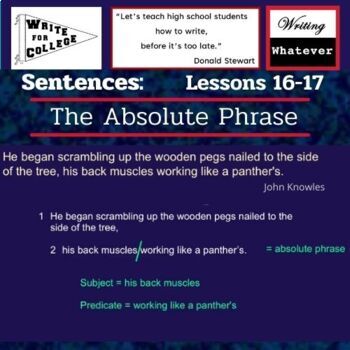
Lessons 16-17: The Absolute Phrase
We had a well-known author come and give a talk at my school about his newest novel. All the students had read it for their English class. As I led him to the gymnasium, I said to him, "I noticed you really like the absolute phrase.""What's that?" he asked.I grabbed my copy of the book, flipped it open to a random page, and immediately found an example. "Look, right here, there's one.""Oh, yes," he replied. "I do like those. What did you call them again?""Absolute phrases," I replied.Ever since
Subjects:
Grades:
9th - 12th, Higher Education
Types:
Also included in: The Complete Sentences Course
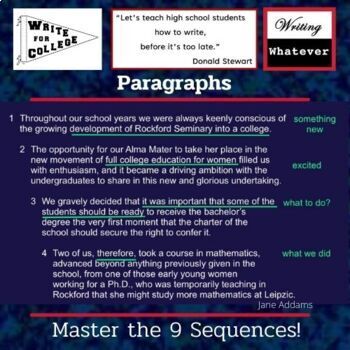
Paragraphs: Master the 9 Sequences!
These seven lessons are all about the body of the essay: Paragraphs. In these lessons we cover nine sequences that will actually enable your students to plan and even visualize an entire paragraph, before they write a single word. That's because we are using the same numbering system that we saw in the Sentences lessons, except that we are writing an entire paragraph rather than just a sentence at a time. Now your students can imagine a 1-2-2-3 as four separate sentences, as they explain their p
Grades:
9th - 12th, Higher Education
Types:
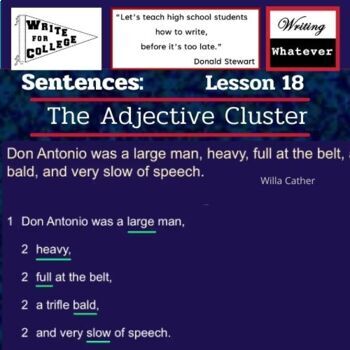
Lesson 18: The Adjective Cluster
Yes, we really do need more examples of Adjective Clusters. It's sometimes hard for students (and authors, I guess) to get the hang of them, but again, they happen outside the main clause, where they have the freedom to elaborate upon the nucleus in a fashion they simply could not achieve in the main clause. What grade level would this be best for? When is it time to drop all those one-word adjectives that are stuffed into the main clause, in favor of the flow and imagery of the lower levels? Th
Subjects:
Grades:
9th - 12th, Higher Education
Types:
Also included in: The Complete Sentences Course
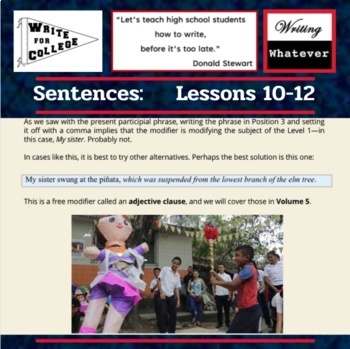
Lessons 10-12: Commas, Goofs, and the end of Passive Voice
As in the previous lessons, the past participle often suffers from commas and misplaced modifiers. But the rules are pretty much the same, and should be easy to master after these few lessons.Again, making up silly sentences will lead to accurate ones. Combine the two units to go on a treasure hunt to find examples in the books they are reading. Have them even take a look at books in other classes, especially History or Science. Our Teacher's Guide also has some fun suggestions.
Grades:
9th - 12th, Higher Education
Types:
Also included in: The Complete Sentences Course
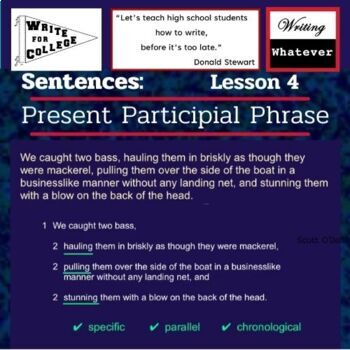
Lesson 4—Present Participial Phrase
Now that we have learned how to place the free modifiers after, before, and within the main clause, we move to the most common free modifier, the present participle. Students will learn where to place it in the sentence, and how to get the most out of its usefulness. See how many they can put in one sentence (see the Harper Lee example!) and have them pick up any book in the library and time themselves how long it takes to find one. They can then submit their findings to the whole class, and hav
Subjects:
Grades:
9th - 12th, Higher Education
Types:
Also included in: The Complete Sentences Course
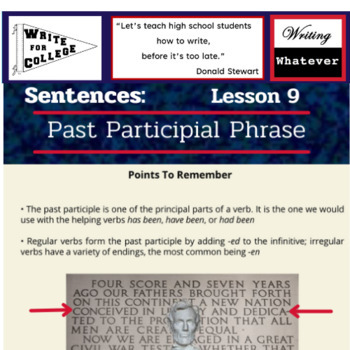
Lesson 9: Past Participial Phrase
The past participial phrase is not as frequent as its predecessor, referring, as its name implies, to the past rather than the present. But it has strength and purpose, and its relationship with the rest of the sentence is often vital to the action in a novel or the reasoning in an essay.It's a fun challenge to the students to find ways to put past participial phrases in their writing. Thinking in terms of the Levels is often a useful approach. Also, sentences that are built upon phrases contain
Subjects:
Grades:
9th - 12th, Higher Education
Types:
Also included in: The Complete Sentences Course
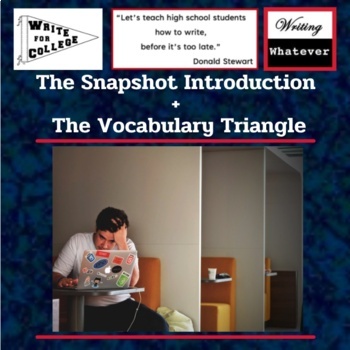
Essay Introductions + Vocabulary Triangle
Teach your class how to make the introduction to the essay look like an authentic photograph of the moment, culminating in a roadmap that sets up the entire essay. The topic here explored is Charlemagne, but it could be any person, place, thing, or idea that you want the class to tackle. Again, it becomes a template that is flexible and whose design inspires specific details to support the presentation. A recipe for confidence and success.The "Vocabulary Triangle" is not so much a writing trick
Subjects:
Grades:
9th - 12th, Higher Education
Types:
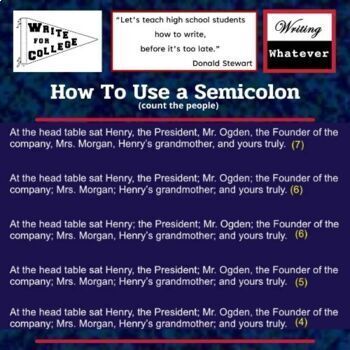
Semicolons + Correlative Conjunctions
What percentage of your students screw up semicolons? Let's put an end to it, and have a hysterical time doing it. We've got the pattern, so it's simple. And as I say in the video, mastering the semicolon will bring better grades and better college application essays.As for Correlative Conjunctions, they are a favorite of all kinds of fill-in-the-dots-with-your-number-2-pencil tests. The little rule you see on the image of the page shows the simple answer about getting it right. Again, practice.
Subjects:
Grades:
9th - 12th, Higher Education
Types:
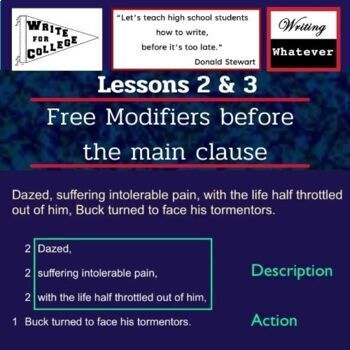
Lessons 2-3: Free Modifiers Before and Within
So, now we have seen free modifiers doing their thing—making the writing more detailed, flowing, and satisfying. I hope you are thinking about how you can apply these lessons to the books that you teach. It is far more appealing when the students are alert as they read, and pretend it's a treasure hunt for new features that they can add to their next writing assignment.After having studied Lessons 1-3, which were touched on in the "Free Product" offer, the students are asked to write out the le
Subjects:
Grades:
9th - 12th, Higher Education
Types:
Also included in: The Complete Sentences Course
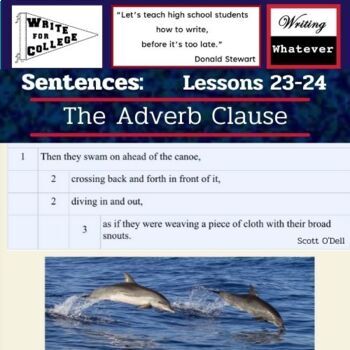
Lessons 23-24: The Adverb Clause
The adverb clause is so much easier to teach and understand than the adjective clause. Take a sentence, slap a coordinating conjunction on the front of it, and you're done. A fun exercise in class is to pair up. One person says a sentence, the other person adds the conjunction. Maybe do it in circles of six or eight, depending on the number of students. And maybe have them, before you begin, select a simple sentence (no free modifiers) from a book they are reading, and that will be the one they
Subjects:
Grades:
9th - 12th, Higher Education
Types:
Also included in: The Complete Sentences Course
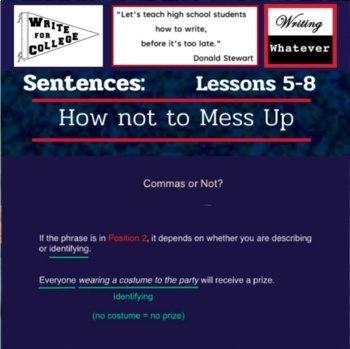
Lessons 5-8: How not to Mess Up
As with any new adventure, there will be some cautions that must be applied. Confidence can turn into overconfidence, as the students discover these new elements of writing and are eager to try them out all over the place. These four lessons explain how to avoid mistakes. Let them have some fun by intentionally writing misplaced modifiers, and then fixing them. They will learn quickly to get it right, and they will want to share their successes as well.
Grades:
9th - 12th, Higher Education
Types:
Also included in: The Complete Sentences Course
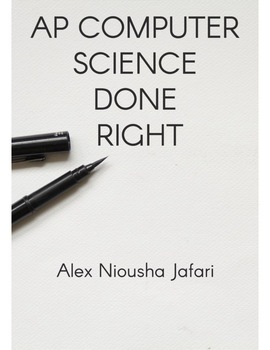
AP Computer Science (a) Done Right
The book covers the AP CS Java course with teachers, students, and their limited schedules in mind. Its sections' topics exactly match classroom lessons. All of them together make up a complete semester course. It is also the first AP book to approach programming with a design system. The lessons are thus not just about programming but also about systematic problem solving.Your students will love the fun and obscure homework problems!Full book available in my profile.
Subjects:
Grades:
9th - 12th, Higher Education, Adult Education
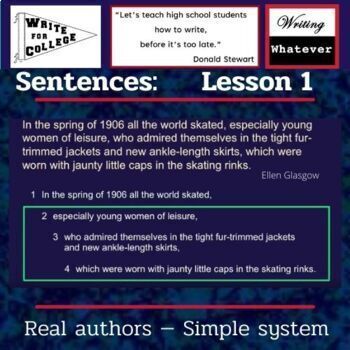
Six Free Lessons
When we want to learn how to improve our tennis serve, we watch videos of Serena Williams. When we want to learn how to shred the guitar, we listen to Jimi Hendrix. And when it comes to learning how to ride a bicycle, we turn to Mom or Dad. We go to the experts. And when we walk around the classroom discussing great literature, we are holding hands with an expert. Maybe it’s J. K. Rowling, or John Steinbeck, or Tara Westover, or Elie Wiesel. My favorite was Jack London, and the book was The Call
Subjects:
Grades:
9th - 12th, Higher Education
Types:
Also included in: The Complete Sentences Course
Showing 1-13 of 13 results

